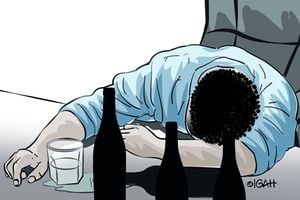
Bernard Kemboi, 40, a teacher from Kaptim village, Eldama Ravine Sub-County during an interview at Eldama Ravine town on October 13, 2024.
In May 2005, Bernard Kemboi, 40, walked into the University of Nairobi, enthusiastic that he would fulfill his dreams of becoming a teacher. For him, studying for a Bachelor's degree in English and Literature was a dream come true, a dream he had harboured since his secondary-school days.
Just a week after joining campus, there was a mega bash to welcome first-year students, a Freshers’ night as it is known among comrades,’ and here, he was introduced to alcohol.
He would later learn that attending that party would impact his life in a manner he wouldn’t have wished for forever.
“I had never entered a club nor tasted alcohol. At the Freshers' night, my friends claimed that for me to survive on campus, I had to take a little alcohol to ‘steady my nerves’,” recalls the last born in a family of six.
“I thought it was just a little as they said, but I gradually graduated into an alcoholic.”
After the party, he started taking light liquor and slowly got accustomed to it. As he could no longer afford the expensive liquor, he turned to the “hard cheap stuff” to satisfy his urges.
Things took a drastic turn when he was elected an official of the Student Organisation of Nairobi University (SONU) during the second semester of his first year. The position came with a lot of money, outings, and seminars that were usually done overnight.

Bernard Kemboi, 40, a teacher from Kaptim village, Eldama Ravine Sub-County during an interview at Eldama Ravine town on October 13, 2024.
He was also elected to different positions in the organisation until when he was in his third year.
In his first and second years in university, he managed to balance alcoholism, leadership, and his education.
However, the third year became challenging because he could not attend lectures or sit for an examination without taking alcohol.
Secured employment
“I had to look for money to buy alcohol before sitting for my examination, which affected my performance. But I thank God, I finally graduated,” he tells Nation.Africa.
After graduating in 2010, he started to teach at Maji Mazuri Girls Secondary School in Eldama Ravine, hired by the Board of Management (BOM), where he worked for two years until 2012 when he was transferred to Kabimoi Secondary School on similar terms.
In 2015, he secured employment with the Teachers Service Commission (TSC) and was posted to Sirwa Secondary School in Mogotio Sub-County, neighbouring his home.
Here, assured of a steady paycheck, his alcoholism checked in again.
He tells of how, upon receiving his first salary, a three-month lump sum, he skipped work for three weeks.
He recalls moving from a different town, spending the money on alcohol, and never reporting to his workstation.
“The school principal tried to look for me, but I had switched off my phone,” he says.
When he went back to his workstation after 21 days, the principal did not want to interdict him, and instead wrote him a warning letter asking him to mend his ways and stop overindulging in alcohol.

Bernard Kemboi, 40, a teacher from Kaptim village, Eldama Ravine Sub-County during an interview at Eldama Ravine town on October 13, 2024.
“But that appears to have hit a brick wall. For as long as I would have money, I would never step in school, spending all my salary on alcohol to the last penny before I could resume,” he says.
His unbecoming behavior earned him several warning letters and at one time, he opened up to the principal that he was addicted and could not teach without taking alcohol.
“I remember one time I asked the principal to allow me to take half of the ‘hard stuff’ every morning so that I could go to class and teach,” recalls Kemboi, now a reformed addict.
Alcoholic monster
Realising that he could not change his ways, the principal consulted his employer TSC and he was transferred to Mugurin Secondary School in far-flung Mogotio Sub-County.
But before this, his salary was halted and he was forced to stay in school and teach because he had no money to spend on alcohol.
“I remember for close to three months, I was a very good young man and taught my students very well. The principal at my new workstation was wondering why I was demonised for being an alcoholic. According to him, I was a good teacher,” he recalls.
But it wasn’t long before the alcoholic monster manifested again.
After three months, he received his salary and disappeared to Mogotio town, kilometres away, absconding from duty and staying in a pub for two good weeks.
“I could not sleep whenever I had money until I had spent it all on alcohol,” he tells Nation.Africa.
He went back to school, arriving at night at the teachers’ quarters in the school compound where he lived.
This surprised his new principal, whose confidence and love he had won as a dedicated teacher, he recalls.
His house was the second room after the principal’s. Because he was still drunk, he mistakenly entered the principal's room, which was unlocked, went straight to bed, and fell asleep.
“When the principal returned from the remedial classes in the evening, he found a ‘monster’ in his bed, as he had described to the school watchman when he raised the alarm, not knowing it was me, his ‘good’ teacher,” he recalls.
It was after the watchman checked that it was discovered that it was the tipsy teacher sleeping soundly, on his boss' bed.
He later learned from the watchman that when the principal tried to enquire why he had disappeared from school for two weeks and why he was sleeping on his bed, he had engaged him in a quarrel until the principal opted to look for an alternative place to sleep that night.
Warning letters
The following day after the evening classes, he was summoned by the principal to his office and asked to explain what had happened.
He would then be asked to report to the County Director’s office in Kabarnet the following day for further directions, and there, he received his letter of interdiction in 2017, two years after getting employment from the TSC.
“The director was not interested in getting my side of the story. I had already received several warning letters from the previous schools but I didn’t reform,” he notes.
It was at this point that his wife deserted him.
Being an electioneering period, he did not struggle to get money and he accompanied different politicians on the campaign trail to get paid.
It wasn’t until 2018 that reality hit him that he had no job and he started engaging in menial jobs to earn a living.
In May 2018, he was reinstated, but transferred to Bakhita Secondary School in Eldama Ravine.
But two years later, he deserted his job on claims that he was not getting a hardship allowance and could not teach in the school, demanding a transfer to another school.
Months later, he visited the TSC office in Nairobi to reclaim his job, but his employer was adamant that he had deserted work due to alcoholism and would only be reinstated after going to a rehabilitation centre.
Back to the village, he drowned his sorrows in cheap liquor dens, because he had no more money to maintain his lifestyle.
Stigma would check in because locals were wondering how a university-trained secondary school teacher would come back to the village and do menial jobs.
“I took more alcohol to run away from the unfolding reality,” he narrated.
His employer could not give him any money for rehabilitation as they feared he would squander it on alcohol, insisting he should foot the costs himself.
“They could only take me back when they had proved beyond reasonable doubt that I had reformed,” he said.
After life took a drastic turn, in January this year, he went to look for Lands Principal Secretary, Nixon Korir, whom he schooled with in university, and shared his predicaments and his willingness to reform and get back his job.
The PS, however, told him that he would not give him any money, but would connect him to a rehabilitation centre.
He advised him to visit Second Lady Pastor Dorcas Rigathi, who was sponsoring rehabilitation for men enslaved by drugs and alcohol.
That is how he walked into Koiwa Rehabilitation Center in Bomet County in February and embarked on his journey to redemption.
He recalls his first day at the rehab as being very challenging.
“I felt that I could not put up at the institution even for a day because I was trembling, sweating, and hallucinating. The first two weekends were a nightmare, but gradually, I regained my consciousness and appetite and started taking food,” he says.
“I thank God because there are clergy at the centre who nurtured me spiritually. I even got saved one morning after being prayed for,” said the now-reformed teacher.
At the rehab, he published the ‘Koiwa Rehabilitation Center Magazine,’ documenting what happens there.
In May this year, he graduated from the rehabilitation centre as a reformed man and in September, was reinstated to his work by the TSC.
Back from the facility, he formed the ‘Youth Against Alcohol and Drugs (YADA),’ and has been a crusader against alcohol and drug abuse.
“I believe we should speak to people about alcohol and drugs to save many from addiction,” he says.
The group now has more than 200 members and through it, more than 10 addicts have been helped to go to rehabilitation centres.
The reformed teacher says they are working round the clock to spread the message of redemption, working closely with the clergy. He hopes to eventually work with Nacada as well.
“My message to those struggling with alcohol and drugs is that they must accept that they have a problem and cannot solve it on their own. They should seek assistance and not relapse once on the recovery journey,” says Kemboi.
“On my graduation day at the rehabilitation centre, I made a pact with myself never to go back to alcoholism seeing how it ruined my life and tormented my family.”






